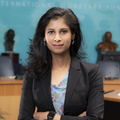Friday, Apr 22, 2022 | 10:30 AM - 11:30 AM
Location: Meeting Halls A&B, HQ1-3-430A&B
What’s driving recent price spikes, and how long will high prices last? This session will delve into the ongoing surge in global inflation. Participants will discuss supply and demand factors and explore the persistence of rising price pressures. They will cover the impact of the war in Ukraine, the large increases in commodity prices --- including food and energy --- and the risk of inflation remaining elevated. The panel will also weigh in on how central banks can deliver on their price stability objective in such an environment, while protecting the ongoing recovery.
 |
Gita Gopinath First Deputy Managing Director, IMF |
Gita Gopinath is the First Deputy Managing Director of the International Monetary Fund (IMF) as of January 21, 2022. In that role she oversees the work of staff, represents the Fund at multilateral forums, maintains high-level contacts with member governments and Board members, the media, and other institutions, leads the Fund’s work on surveillance and related policies, and oversees research and flagship publications.
 |
Andrew Bailey Governor of the Bank of England |
On 20 December 2019, Andrew Bailey was announced as the new Governor of the Bank of England.He began his term on 16 March 2020.
Andrew Bailey served as Chief Executive Officer of the Financial Conduct Authority (FCA) from 1 July 2016 until taking up the role of Governor. As CEO of the FCA, Andrew Bailey was also a member of the Prudential Regulation Committee, the Financial Policy Committee, and the Board of the Financial Conduct Authority.
Andrew previously held the role of Deputy Governor, Prudential Regulation and CEO of the PRA from 1 April 2013. While retaining his role as Executive Director ofthe Bank, Andrew joined the Financial Services Authority in April 2011 as Deputy Head of the Prudential Business Unit and Director of UK Banks and Building Societies. In July 2012, Andrew became Managing Director of the Prudential Business Unit, with responsibility for the prudential supervision of banks, investment banks and insurance companies. Andrew was appointed as a voting member of the interim Financial Policy Committee at its June 2012 meeting.
Previously, Andrew worked at the Bank in a number of areas, most recently as Executive Director for Banking Services and Chief Cashier, as well as Head of the Bank's Special Resolution Unit (SRU). Previous roles include Governor's Private Secretary, and Head of the International Economic Analysis Division in Monetary Analysis.
 |
Nor Shamsiah Mohamad Yunus Governor of Bank Negara Malaysia |
Ms. Nor Shamsiah is the Governor of Bank Negara Malaysia, assuming office on July 1, 2018. Prior to her appointment as Governor, she served as Assistant Director of the Monetary and Capital Markets Department of the International Monetary Fund. Ms. Nor Shamsiah joined Bank Negara Malaysia in 1987 and has served in various areas including prudential regulations, legislation, policies and guidelines for the financial sector and supervision. As Deputy Governor from 2010 to 2016, she was responsible for banking, insurance and Takaful supervision, financial intelligence and enforcement, talent management, finance and shared services of the central bank. She graduated from the University of South Australia with a Bachelor of Arts in Accountancy and is a Certified Practicing Accountant (CPA).
 |
Richard Quest Anchor, CNN |
Richard Quest is CNN's foremost international business correspondent and anchor of Quest Means Business (QMB). Based in New York, he is one of the most instantly recognizable members of the CNN team. QMB, which airs on CNN International, destroys the myth that business is boring, bridging the gap between hard economics and entertaining television. CEOs and global finance ministers make a point of appearing on QMB. Guests of the show have included world leaders; the biggest names in banking; and some of the most influential names in corporate America. Quest has regularly reported from G20 meetings and attends the World Economic Forum in Davos, Switzerland each year. Quest has covered every major stock market and financial crisis since Black Monday in 1987 and has reported from key financial centers globally including Wall Street, London, Sao Paolo, Tokyo and Hong Kong. In addition, Quest is the established airline and aviation correspondent at CNN. He currently presents the monthly CNN Business Traveler show, the definitive authority on making the most of doing business on the road. As a business travel specialist, Quest has become a voice of authority on subjects like the launch of the Airbus A380. Most recently, Quest has extensively covered the disappearance of Malaysia Airlines Flight 370 across CNN/US and CNNI. Quest is also the face of CNN’s coverage of major UK news events. His coverage of breaking news, which has spanned two decades, has seen him report on a range of stories from, the death of Yasser Arafat, the Lockerbie Pan Am 103 crash to the death of Michael Jackson. Prior to joining CNN he worked at the BBC, where he was the North America business correspondent, based on Wall Street for 12 years. Quest is British, holds an LLB (Hons) degree in Law from Leeds University, and was called to the Bar.
What’s driving the ongoing surge in global inflation, and how long will high prices last? The panelists discussed supply and demand factors, including the impact of the war in Ukraine, and explored the persistence of rising price pressures. The panel also weighed in on how central banks can deliver on their price stability mandate in the current environment, while protecting the ongoing recovery.
Key Points:
Quotes:
“One of the clear messages I am getting from this [Spring Meetings] week is that we have to be very focused on resilience.” Andrew Bailey “The best policy response, also for inflation, would be to end this war.” Gita Gopinath “We need the tightening at this point, but we need to be very careful about the danger of overtightening.” Helene Rey
Contributor: Veronika Sola